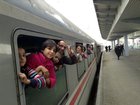Peoples assembly, 2nd round (26.07.2013)
Instead of the white march the malian section of Afrique-Europe-Inteact has organised two people's peace assemblies in May & July in Bamako which have been supported with 9.000 Euro by the european section of our network
General election fever in Mali despite massive criticism of early date of elections. Grassroots initiatives demand active participation of the population during the post-electoral process (press release by Afrique-Europe-Interact):
During the course of recent months, representatives of the Malian civil society have again and again criticized the early date of the elections, that has been imposed by France. This criticism has a good reason, as there were numerous irregularities when the ballot papers were made out: According to reports from the electoral commission not only the 18-year-olds are missing in the electoral register on a grand scale, but also the inhabitants of hundreds of villages and small towns, as well as a majority of the war refugees who are waiting for their return in the neighbouring countries Burkina Faso, Mauritania, and Niger. Yet grassroots activists report from Bamako, that a kind of “democratic spring” has now broken out, meaning that there is an explicit effort of the people, “to make the electoral process their own”, as a manifesto of the Malian section of Afrique-Europe-Interact points out. Because since the beginning of the election campaign during the “jamboree of promises and intentions” by the 28 presidential candidates the population – so the manifesto – has better than ever understood the true content of slogans like “change, dialogue, cohesion and social development”.This manifesto was published on the occasion of a public meeting (“assemblée citoyenne”), which was carried out by Afrique-Europe-Interact for the second time in Bamako on July 21st. About 400 people came to this meeting – over 100 of them were refugees from the North, including many representatives of Tuareg and Arab communities. The meeting took place in the middle of a public soccer field in the Djellibougou district to ensure that ordinary citizens (predominantly mobilized via radio) would participate. As with the first public meeting on May 4th, the critical examination of corruption, mismanagement, and impunity were the main topics discussed during this conference. For the central thesis of the process of these meetings is, that there is no such thing as an emotionally charged ethnical conflict between North and South, as the Tuareg-rebels of the MNLA, who are criticized even by large numbers of the Tuareg population, claim again and again. Accordingly, during the meeting representatives of different parties – including representatives of the former governing party ADEMA – had to answer critical questions of the participants, which had been published in advance. From the perspective of the Malian section of Afrique-Europe-Interact the current election fever is anything but incidental. As Alassane Dicko from the Association of Deportees Mali (AME) points out, this election fever rather shows the ingrained desire of both the urban and the rural population to finally become seriously involved in the political processes of their country. It therefore takes up the spirit of opimism of the putsch in March 2012, which was generally welcomed by the population at large. For this putsch has not damaged democracy, as it has been claimed especially in Europe again and again, but on the contrary has saved democracy from its final destruction by the political class led by the long-standing president Amadou Amani Touré. Against this background, it seems logical, that many of the candidates up for election have announced, that in the case of their election victory they would convoke a kind of national conference (“concertations national”), so that the requirements and expectations of the population will be heard.
The two public meetings were supported with € 9,000 from the European section of Afrique-Europe-Interact – these funds have been raised solely by small-scale fundraising activities.
For inquiries, please contact Olaf Bernau: 0049-151-52527776. We can also get you in touch with French- and English-speaking activists in Bamako.



